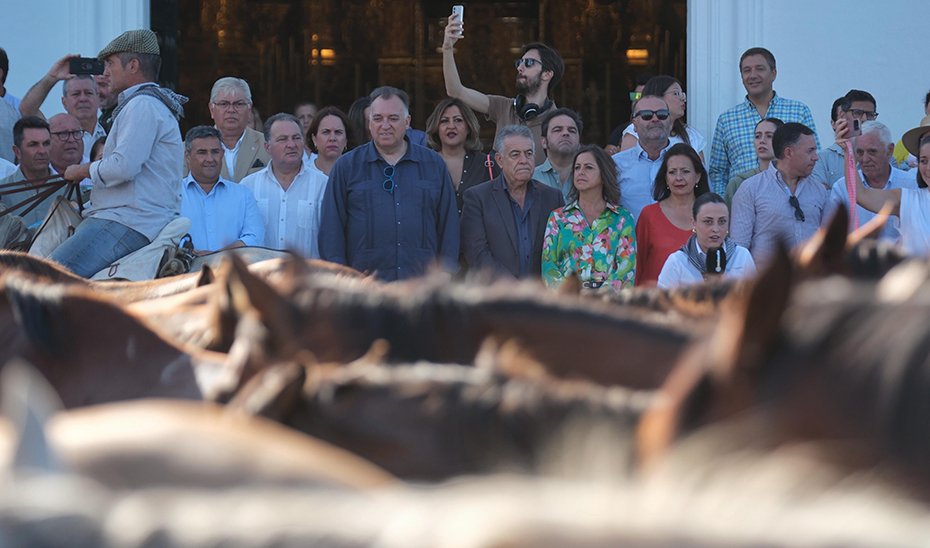The village of El Rocío has been the setting for one of Andalusia’s most unique events: the Saca de las Yeguas. The Minister of Sustainability and Environment, Catalina García, and the Minister of Tourism and External Andalusia, Arturo Bernal, have traveled there to accompany the marshland farmers and show the support of the Andalusian Government for a tradition that combines sustainable livestock management, popular culture, and tourist appeal.
From the marshes of Doñana to Almonte, the mares and foals follow a traditional route that will culminate on the afternoon of June 26th. During the journey, the animals cross through the village of El Rocío, pass by the Virgin’s hermitage and continue to the municipal livestock enclosure of Almonte, where traditional tasks such as grooming, mane cutting, and selling foals are carried out.
During the visit, Minister Catalina García emphasized «the firm commitment of the Junta de Andalucía to the active conservation of protected natural areas and to those who, like the marshland farmers, have been caring for and shaping these landscapes for generations.» She highlighted that extensive livestock farming is much more than a preservation element for Doñana. «Undoubtedly, it has been key in shaping its ecosystems, while safeguarding native breeds such as the marshland mare and the mostrenca cow, of great cultural and genetic interest.» Extensive livestock farming is a traditional use considered compatible with the regulations of the protected area, as the presence of cattle has contributed to the shaping and maintenance of Doñana’s ecosystems.
Catalina García also highlighted «the cultural value of this tradition, which is not only part of the living history of Doñana but also strengthens the emotional bond between its inhabitants and the natural environment.» In this sense, she pointed out that «events like the Saca de las Yeguas remind us that sustainability also involves keeping our roots alive.»
On his part, Minister Arturo Bernal recognized that «events like this are a treasure for Andalusian tourism.» He mentioned that «the Saca de las Yeguas is becoming increasingly known and appreciated, both inside and outside our borders, attracting thousands of visitors each year seeking authenticity, excitement, and contact with our deepest traditions.» He added that «the symbiosis between culture, environment, and tourism is one of the great assets of our autonomous community, and the Andalusian Government will continue to promote it decisively.»
The event, which dates back to ancestral times, is organized by the National Association of Marismeño Cattle Breeders, with the collaboration of the Ministry of Sustainability and Environment, through the Doñana Natural Space, which organizes activities within the protected area in conjunction with the Association and authorizes them, and the Almonte City Council, which participates in the activities carried out from El Rocío to the livestock enclosure.
Although the final number of animals has not been confirmed yet, it is estimated that between 1,000 and 1,300 mares and foals will leave the marshes this year. In the days leading up to the route, farmers have gathered the livestock from various estates in the National Park and Natural Park, organized into 16 groups that have stayed overnight inside this protected area. From there, the troops of mares have been grouped in the park’s enclosures, ready to start their journey to Almonte.
The passage of the mares through El Rocío attracts thousands of people each year, who come from both the town and outside Andalusia to witness a spectacle of natural beauty and strength that captivates those who experience it up close. After crossing El Rocío and resting halfway, the mares will arrive in Almonte in the afternoon, where traditional activities will be held until, on July 1st, they will begin their return to the marshes, thus completing an ancestral cycle of respect and coexistence between humans and the natural environment.
Also present at the event were the Mayor of Almonte, Francisco Bella, the Mayor of Hinojos, Joaquina del Valle, the Government Delegate of the Junta de Andalucía in Huelva, José Manuel Correa, the President of the Provincial Council of Huelva, David Toscano, the Director General of Protected Natural Spaces, José Enrique Borrallo, the Director General of Forest Policy and Biodiversity, Juan Ramón Pérez Valenzuela, the Director of the Doñana Natural Space, Juan Pedro Castellano, the Territorial Delegates of Sustainability and Environment and of Tourism and External Andalusia in the province of Huelva, Pedro Yórquez and Teresa Herrera, respectively, and the President of the Huelva Cattle Breeders Association, Diego Díaz, along with Environmental Agents and other authorities.

